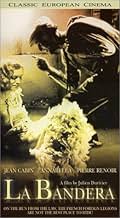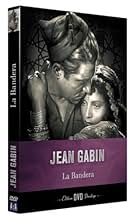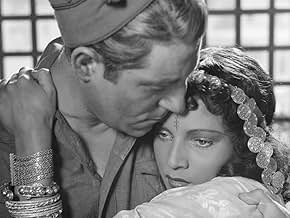Füge eine Handlung in deiner Sprache hinzuPierre Gilieth has committed a murder in Paris. He flees to Barcelona, where he runs out of money. He joins the Spanish Foreign Legion and there he meets two fellow countrymen, Mulot and Luc... Alles lesenPierre Gilieth has committed a murder in Paris. He flees to Barcelona, where he runs out of money. He joins the Spanish Foreign Legion and there he meets two fellow countrymen, Mulot and Lucas. He tries to forget his crime, but Lucas's friendship soon appears to be less unselfish... Alles lesenPierre Gilieth has committed a murder in Paris. He flees to Barcelona, where he runs out of money. He joins the Spanish Foreign Legion and there he meets two fellow countrymen, Mulot and Lucas. He tries to forget his crime, but Lucas's friendship soon appears to be less unselfish.
- Regie
- Drehbuch
- Hauptbesetzung
- Le lieutenant
- (Nicht genannt)
- L'importun de l'auberge
- (Nicht genannt)
Empfohlene Bewertungen
I don't know much about the beginnings of the poetic realist movement in French cinema, but Duvivier was one of its main practitioners, and this is a precursor to his great PEPE LE MOKO, where the powerful, rash man is driven to destruction by love. Though not as accomplished as the later Gabin romances PORT OF SHADOWS, THE HUMAN BEAST, or LE JOUR SE LEVE, LA BANDERA has its charms. In addition to a great role and performance by Gabin, there is a strong supporting cast including Raymond Aimos, Pierre Renoir, and the indispensable Gaston Modot. Recommended!
The best part of the movie ,in my opinion,is the description of the fort,the barrack-rooms,the brothel .Here,the hero falls in love with a morrocan girl.There's the rub:she's played by Annabella (who was Tyrone Power's wife) who does not look like a North African,not at all,hence the necessity to make her up outrageously ,with ugly results.
Like in "Beau Geste",the Arabs are the baddies,period.The courageous legionnaires always call them "les salopards" (the bastards).Duvivier achieves a real tour de force here:we never see the enemy when they attack the little fort!The poisoned water is a good dramatic idea and the final echoes Edith Piaf's song "le fanion de la légion".
However,"la bandera",with its military stereotypes, does not equal Duvivier's other pre-war works "la fin du jour" ,"carnet de bal" , "la belle équipe" or "pépé le moko" ,the latter taking place in North Africa too.
So Jean Gabin, after a streak of relatively forgettable movies in the early 30's, knew that the time of doing films to make ends meet was over, he started to pick those that met his expectations. He and Duvivier bought the rights of "La Bandera", Pierre Mac Olan's novel about a criminal hiding in Spanish Foreign legion with the Moroccan Riff War as the backdrop. The director had trouble finding money but the SNC (French Cinema National Society) never regretted its choice to fund "La Bandera", an instant classic that immediately launched Gabin's career and consolidated his status as THE leading man and the persona that would define the first of his four-decade spanning career.
And as Pierre Gilieth, Gabin makes two myth converge: the charismatic legionary figure whose handsome and tall physique and "smell of hot sand" was praised by Edith Piaf in one of her most famous songs and became a popular expression, and there is the myth of Gabin, as the character who desperately tries to escape from his past or his condition: a loner, a deserter, here the most extreme case: a criminal. The film opens "Rue St Vincent", with a dying man leaving blood stains on a woman he crosses, this is one of the boldest openings of any French film and the symbolism of the blood stain doesn't call for deep analysis. Someone must carry more indelible marks in his soul.
Then, a fantastic ellipse takes us immediately to Barcelona where Gilieth meets a group of French countrymen who steal his wallet, that he can't call the Police leaves no doubt about his link to the opening crime. The man was a fugitive, now he's broke, and in Spain, he's driven to the inevitable corner of the legion, not without a few fights and a heart-pounding chase in the middle of the streets that looks like a foretaste of the cat-and-mouse game with the Police in "Pepe Le Moko" (also directed by Duvivier). But before the Kasbah, the legion, a no less spectacular and fascinating portmanteau of colorful characters, played the part of the necessary hiding place.
Indeed, there is a commonly known notion that the guys who went to the legion weren't all idealistic young men, some were mercenaries and others had a past they tried to get rid of in order to start a new life, no matter how brief it would be, a new exciting, anonymous short life was better than a miserable one with the burden of an identity. Gilieth chose a life that would equal prison, he's like leading his own quest for redemption for an act he doesn't regret but admits there has to be a price to pay for it. But even an exile in the legion would be too easy, two French guys join him, one is Aimos as Mulot, the jovial street-smart partner, and Robert Le Vigan as Fernando Lucas, the man who starts as a very friendly fellow, but whose smile becomes more suspicious.
Gilieth discovers later that he's an undercover cop assigned to find the St Vincent killer in exchange of 50 000 francs, a fortune. It's very revealing when the most troubled and ambiguous personality is a law enforcer, more of a bounty hunter actually, and Le Vigan gave an extraordinary depth as the nemesis of Gilieth, the actor had a face chiseled for playing traitors and sneaky characters (he actually was 'Jesus' in "Golgotha") so it's quite ironic that his career was cut abruptly because of his support to the Petain government, one of cinema's collateral losses to the war, along with Mireille Balin. His role embodies the same ethical ambiguity, in a place where men get a second break; the representative of the law becomes the undesirable one.
To this glorious cast, Pierre Renoir (brother of director Jean) deserves a mention, he who plays the Captain of the fort, protective, tough but fair and Annabella who represents a more or less credible Berber prostitute named Aicha la Slaoui, and contributes to the romantic subplot. Annabella was the star of the 30's so despite her limited screen-time, she gets the top-billing, like Ida Lupino in "High Sierra" where Bogart was obviously the star, but this is Gabin's "High Sierra" and while the romance doesn't hurt the film, we're no fools, we know it's a man's world where everything will be paid or redeemed on the obligatory battlefield, because legion isn't just about fighting a war but getting rid of demons, and sometimes, it takes one fight to make the ultimate one.
Now, should we root for these men or Gilieth? There is a scene that gives a hint. The Captain gives a legionary four weeks of punishment, two for having promised to kill him and two others for not having done it when he could. As wrong as it was, he should have kept his word. This scene sums up the ethical dilemma of the film, we all make mistakes, and it's not about acting but acting enough to deserve a break. Even the film was dedicated to General Franco for his involvement in the making, needless to say the banner was removed after the events of the Civil War, it's like the film embraced its own poetry about past mistakes.
The random stupidity of racing through the desert on Model A flatbeds after phantom snipers and gun-runners rings truest. This film is not on a humanist/moralist level with La Grand Illusion or Paths of Glory. It's an existential image of war-as-it-happens. The settings are stark, bright and always exposed. Sudden death is intertwined with the boredom of the barracks.
Wusstest du schon
- WissenswertesThe movie was initially dedicated to Colonel Francisco Franco and his troops. The dedication was removed after the Spanish civil war.
- Zitate
concierge: Hey, you speak Spanish now!
Pierre Gilieth: No, but I understand the situation.
- VerbindungenEdited into Geschichte(n) des Kinos: Une histoire seule (1989)
Top-Auswahl
Details
- Erscheinungsdatum
- Herkunftsland
- Sprache
- Auch bekannt als
- Escape from Yesterday
- Drehorte
- Barrio Chino, Barcelona, Katalonien, Spanien(popular district, now redevelopped)
- Produktionsfirma
- Weitere beteiligte Unternehmen bei IMDbPro anzeigen
- Laufzeit1 Stunde 36 Minuten
- Farbe
- Sound-Mix
- Seitenverhältnis
- 1.37 : 1
Zu dieser Seite beitragen































